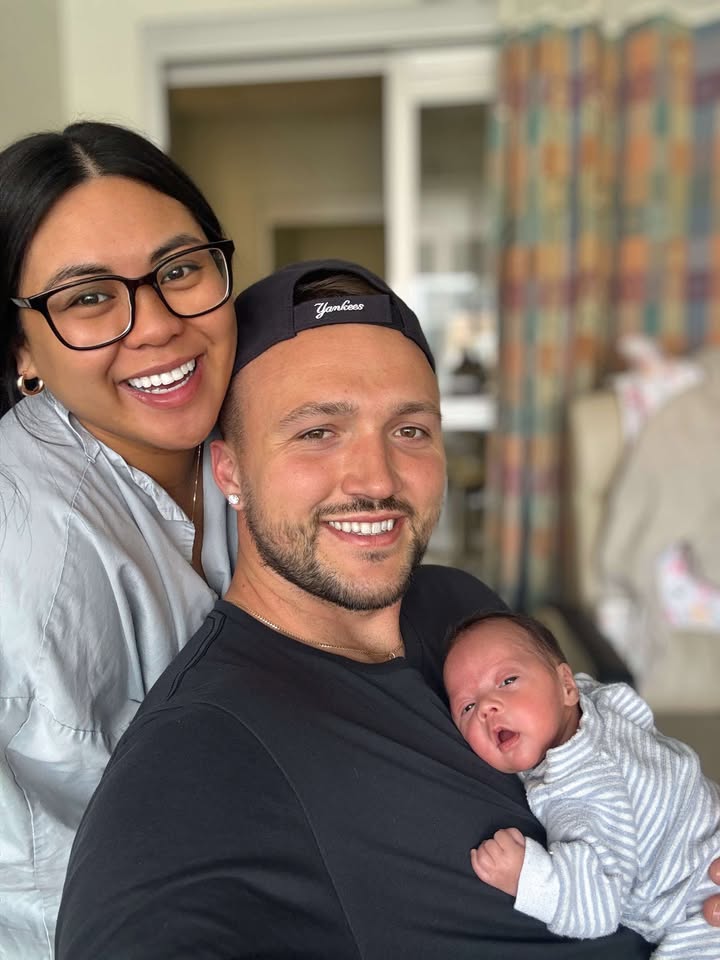
Pictured: Ivy Spooner in the arms of her mother shortly after birth.
February 24, 2025
London Health Sciences Centre (LHSC) is celebrating an extraordinary milestone: a record-breaking number of babies born in 2024. In total, 6,452 babies were delivered between January 1 and December 31. This represents a five per cent increase from LHSC's previous record of 6,139, which was set in 2022.
"The numbers are truly astounding," says Dr. Tracey Crumley, Department Head of Obstetrics and Gynecology at LHSC. "We're thrilled to have welcomed so many new lives into the world last year. It’s a testament to the hard work of our Women’s Care and Children’s Hospital teams, and to the trust our patients and families place in us."
Included in the 6,452 total were 135 sets of twins and six sets of triplets. Fridays were the busiest day of the week and July the busiest month of the year. On average, LHSC saw the arrival of 17 babies each day, with the most being 22.
‘A whirlwind of emotions’
Ivy Spooner was one of the newborns LHSC welcomed last year. She was born to parents Emily and Austin on March 26, nine weeks earlier than expected. When Emily went into labour, her care team explained she'd only get to hold Ivy for a minute before she would be moved to the Neonatal Intensive Care Unit (NICU). It was there that she received highly specialized care for the first 30 days of her life.

“Hearing that Ivy would need to stay in the NICU triggered a whirlwind of emotions,” said Emily. “This would have been stressful under any circumstance, but for my husband and I, it was particularly overwhelming because just a year before we experienced the loss of our stillborn son, Beau.”
The weight of that grief still lingering, Emily and Austin said they believed in their hearts the NICU team was providing Ivy with the best care possible.
“I will always remember my first time seeing Ivy in the NICU,” said Emily. “I fed my hand into her isolette and her tiny hand wrapped around my finger. It was hard to imagine the journey we had ahead, but I promised her we’d be with her every step of the way.”
Throughout Ivy’s time in the NICU, Emily and Austin stayed across the street at Ronald McDonald House. This allowed them to be deeply involved in her care and in near constant contact with the team of specialists working around the clock to help her thrive.
“During morning rounds, we had the opportunity to hear full updates directly from the neonatologists,” explained Emily. “We also had the privilege of being cared for by incredible nurse practitioners, respiratory therapists, registered nurses, dietitians, lactation consultants and more – all of whom played a vital role in our journey.”

Today, Ivy is doing well, thanks in part to the care she received at LHSC. She’s standing on her own, has five teeth and didn't shed a single tear on her first day of daycare – a milestone Emily admits wasn’t quite as easy for her as a mom.
"The guidance and support we received at LHSC has given us the confidence we need to advocate for Ivy’s well-being now and into the future,” said Emily. “We're taking it day by day, watching her grow into the smart, confident and happy girl she is, and it’s been the most rewarding experience of our lives.”
Birthing at LHSC
Serving as one of the largest, single-site birthing units in Canada, LHSC supports care and delivery for pregnant people who call the London and surrounding area home, as well as many high-risk patients from across the province. In 2024, approximately 69 per cent of patients who delivered babies were residents of London, 11 per cent were from Middlesex County, 19 per cent were from southwestern Ontario and 1 per cent hailed from elsewhere.
About 420 specialized staff from areas such as the Obstetrical Care Unit (OBCU), Postpartum Care Unit (PPCU), Neonatal Intensive Care Unit (NICU) and Obstetrical/Gynecology Ambulatory Clinic, Inpatient Gynecology, Midwifery, Family Medicine and Regional Genetics Program played a critical role in managing the surge of babies born, which LHSC attributes to the region’s population growth.
“From obstetricians and anesthesiologists to midwives, nurses, personal support workers, aides, residents and registration clerks, it was truly all-hands-on-deck,” says Dr. Crumley. “The collaboration between our various teams has been nothing short of remarkable, and we’re looking forward to welcoming more little ones into the world together in 2025.”
